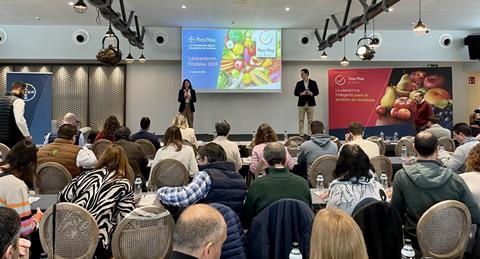The digital tool allows growers to predict phytosanitary residues in fruit trees

Bayer has developed a new digital tool for predicting phytosanitary residues in fruit trees. ResiYou uses artificial intelligence to facilitate decision-making and traceability of crops, helping growers to comply with supermarket standards and consumer demands.
Bayer recently held an event in the northeastern Spanish region of Aragon to present the platform to local growers. ResiYou was already available for strawberry, grape, apple and pear crops, and has now incorporated a new functionality to predict residues in seed and stonefruit trees.
Aragon is one of the largest stonefruit producers in Spain, producing more than 400,000 tonnes of cherries, peaches and nectarines a year.
“One of the greatest challenges facing fruit producers in Aragon is ensuring that their production complies with the requirements of the food chain regarding the maximum residue limits (MRLs) of phytosanitary products at harvest,” Bayer said in a press release.
ResiYou uses models based on AI that incorporate climate data and estimates of the evolution of the crop’s biomass.
“The tool allows the required data to be loaded and obtain predictions of residues in the harvest in real time. According to these predictions and after choosing the destination supermarket or platform, as well as the expected harvest date, ResiYou provides detailed information on the degree of compliance of each plot, in relation to the set of corresponding secondary standards: maximum number of substances, MRLs, etc,” said Agustí Soler, technical manager for ResiYou.
In addition, the platform allows simulations to be carried out prior to phytosanitary treatment and their results to be compared, so that the treatment strategy that best fits the desired final residue profile can be chosen. It also includes a calendar to quickly identify the plots that would be ready to be sent to the selected destination on each date, based on the requirements.
José Luis Robles, head of digital tools at Bayer, noted that legislative and commercial trends “show the need to rationalise the use of phytosanitary products, both synthetic and biological, limiting the development of resistance and contributing to environmental and economic sustainability”.
Anna Claverol, ADV Cultius technician at Terra Ferma, explained that ResiYou helps the company to “better plan their work in order to meet production standards and thus assess the treatments to be carried out on different plots”.
The sessions ended with a practical demonstration in which attendees could carry out simulations with the phytosanitary products they apply to their crops and compare the residues they expect with the predictions obtained through the tool.
Bayer said ResiYou is part of its catalogue of solutions for regenerative agriculture that allows the restoration of soil health, reducing the impact of climate change and improving crop productivity through various practices.



